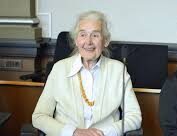Smiling and inflexible Ursula Haverbeck
[Paul Eisen sends us a video with Ursula Haverbeck entitled “I want to tell the British people… ”. Perhaps a French-subtitled version of it will also appear. Maybe we shall even be rewarded with a specific video in French.]
Paul Eisen, a British Jew and a revisionist, today sends us a video by Lady Michèle Renouf on Ursula Haverbeck, “the great German lady” who is waging, quite openly, a heroic battle in her country against “the Holocaust lie”. During the visit she paid me at my home on January 8, 2014 I was struck by her frankness, clarity, energy and determination. Anyone aware of the ferocity with which repression of revisionism is exerted in Germany can only admire this follower of Sylvia Stolz, “the German Joan of Arc”.
In France I myself have, for many years and in various forms, kept on saying to those who accuse Germany of having developed and used a weapon of mass destruction called “gas chamber”: “Show me or draw me a [Nazi] gas chamber!” But I have never received an answer, except by way of a lengthy statement bearing the signature of 34 French historians and including the following passage: “One must not ask oneself how, technically, such a mass murder was possible. It was technically possible, since it happened” (Le Monde, February 21, 1979). In the United States, Bradley Smith has since 2008 been throwing down a similar challenge, particularly to his country’s academics: “Can you provide, with proof, the identity of one person killed in a German gas chamber at Auschwitz?”; no answer there either. Ursula Haverbeck has for five years been putting the question “Where did the six million Jews die?” to the most qualified authorities in Germany; total silence there as well.
This kind of silence is accompanied, as the case may be, by cries of indignation, insults, reprisals at the professional level and police, judicial and media actions. In the case of Ursula Haverbeck, which I have already discussed in recent days, the German police and justice system had proved rather inactive, even, after a few trials, implementing a policy of silence. It would take, in 2015, the resounding public interviews of the “the great German lady”, aged 87, for German judges finally to decide to order a police search of her house, which lasted six hours and bodes serious legal troubles.
But, like Lady Renouf, like Sylvia Stolz, Ursula Haverbeck will refuse to obey “the unjust force of the law”. She is opening, in the very heart of Germany, a new era in the history of historical revisionism.
June 8, 2015

